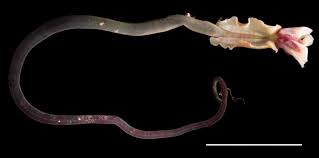
The Judi Sea Worm Discovery: A New Understanding of Underwater Ecosystems
Embark on a fascinating journey into the depths of the ocean as we unveil the discovery of Judi, an extraordinary sea worm found in the Caribbean’s mysterious deep waters. This revelation, named after the esteemed UWI biology professor Judith Gobin, sheds light on the enigmatic world of deep-sea biodiversity. Join us in exploring the unique characteristics and significance of this newly identified species, emphasizing the importance of continued research and conservation efforts in understanding our planet’s hidden marine treasures.

In a recent discovery, a new species of deep-sea worm has been named after a biology professor from the University of the West Indies (UWI). The worm, named Judi, was discovered during a research expedition in the Caribbean Sea. This finding is significant as it sheds light on the diversity of life in the deep sea and highlights the importance of continued exploration and research.
Overview of the Sea Worm Judi
The Lamellibrachia Judigobini aka the “Judiworm,” named after benthic marine biologist Professor Judith Gobin. Judi is a type of polychaete worm, which is commonly found in marine environments. However, this particular species was found at depths of over 3,000 meters, making it a deep-sea creature. The discovery was made by a team of researchers from the UWI and the University of Louisiana at Lafayette. They used a remotely operated vehicle to collect samples from the seafloor.
The new species was named after Dr. Judith Gobin, a biology professor at UWI who has dedicated her career to studying marine biodiversity in the Caribbean. Dr. Gobin has been instrumental in promoting research and conservation efforts in Trinidad and Tobago and the wider Caribbean region. Naming the worm after her is a fitting tribute to her contributions to the field of marine biology.
The discovery of Judi highlights the importance of deep-sea exploration and research. The deep sea is one of the least explored environments on Earth, and there is still much to be discovered about the organisms that live there. Studying these creatures can provide valuable insights into their adaptations to extreme environments and their potential uses in medicine and biotechnology.
In conclusion, the discovery of Judi, a new species of deep-sea worm named after Dr. Judith Gobin, is a significant finding that highlights the importance of continued exploration and research in the deep sea. This discovery adds to our understanding of the diversity of life in the ocean and underscores the need for conservation efforts to protect these unique and valuable ecosystems. As we continue to explore the depths of the ocean, we can expect to find many more fascinating and important discoveries like Judi.
Disclaimer: The information provided in this content is for general informational purposes only. It is not intended as medical or healthcare advice, diagnosis, or treatment. Always seek the advice of a qualified healthcare professional with any questions you may have regarding a medical condition or healthcare decisions.

